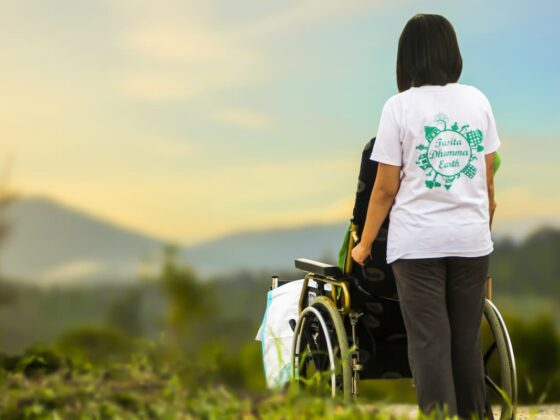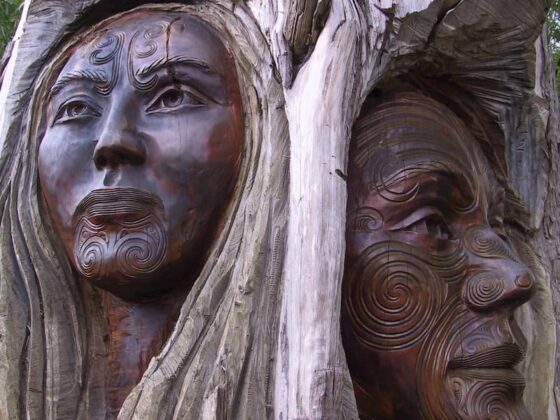Catherine Gurtin: Building Bridges for Migrant Mothers and Children
The real vision extends beyond crisis intervention: “True empowerment bridges built by women, for all.”
Catherine Gurtin, CEO of PathFinders, has dedicated the last 6 years of her career to empowering migrant domestic workers (MDW) and their children in Hong Kong. In this candid interview, she shares her journey, the challenges of advocacy, and her vision for a more equitable future.
Catherine Gurtin’s work with PathFinders empowers migrant domestic workers – backbones of households and economies – through initiatives like #WorkingMomsHK and employer education, reframing their labour as skilled and dignified. When mothers retain jobs or employers become allies, outdated hierarchies fall, proving fairness fuels productivity.
PathFinders drives systemic change: policies granting migrant children healthcare and shifting perceptions of domestic workers from “servants” to partners. Globally, migrant struggles reveal interconnected inequalities. Empowerment is justice – legal reforms, safe childcare, and campaigns amplifying voices.
Catherine’s mission: collective action to ensure no woman sacrifices dignity for survival. True empowerment bridges built by women, for all.
Q1. Your life story is deeply intertwined with advocating for marginalized communities. Could you share a pivotal moment that ignited your passion for women’s empowerment?
The launch of our Ambassadors programme in 2019 was a pivotal moment for the team and I at PathFinders. Key to Crisis Prevention and now entering its sixth year, this programme continues to demonstrate just how much is possible when you educate and mobilise MDWs as Community Leaders to educate and protect their peers. We couldn’t be more inspired by 392 MDWs we have professionally trained to date.
The majority of the 360,000 MDWs employed in our city are of childbearing age. Social and cultural norms in their home countries often don’t encourage comprehensive sexual and reproductive health (SRH) education and/or gender equality. When they arrive in Hong Kong (HK) they are lonely and vulnerable to the advances of men in the park on their only day off, who whisper sweet words and make empty promises, only to disappear in the event of a pregnancy. By ensuring these women are empowered with SRH education, understand the foundations of a loving and healthy relationship and aware of love scams, we hope to see less crisis pregnancies and more planned approaches to parenthood.
Q2. What motivated your transition from the corporate sector to leading PathFinders?
At the start of my career, I worked for over a decade in communications and public affairs, latterly as an Associate Director in the International Public Affairs team at Pfizer. In all my corporate roles I gravitated towards patient literacy, advocacy and stakeholder engagement, motivated by a desire to improve people’s lives – so my transition to the NGO sector was a fairly natural evolution in wanting to continue to use my purpose and passion to effect change.
I’ve often struggled with the reality that who or where you are born seems to determine many of the opportunities available in life. Even as a child, I had an insatiable curiosity and questioned ‘why’, especially in situations I perceive to be inherently unfair. It was hard to fathom why I was so fortunate to be born to parents who made extraordinary sacrifices to give me the best start in life. While so many others, simply by chance, were born into extreme poverty and deprivation.
Before joining PathFinders, I spent 7 years with Save the Children. Initially in the Asia Regional Office in Singapore, before transferring to Hong Kong as COO. When approached to lead the team at PathFinders, it struck me as a wonderful opportunity to ‘touch the ground’ and seek to create a meaningful impact for those less fortunate.
Q3. Tell us about PathFinders’ #WorkingMomsHK initiative. How does it support migrant mothers?
#WorkingMomsHK is our very first public engagement campaign. Launched in 2021, it seeks to celebrate ALL working moms in HK and increase understanding, acceptance and support for an MDW pregnancy, and respect for MDWs as moms. Through this campaign we want to collectively lay societal foundations that build a culture of appreciation for the vital social and economic contributions of MDWs.
A large number of the 360,000 MDWs in HK are mothers who have made the very difficult decision to be away from their children to provide them with a fair start and brighter future. As a mother myself, I can’t even begin to imagine the pain behind every goodbye and the deep desire to hug my children during the long months and years of separation.
Many MDW mothers capably juggle their heavy workload and support their children in every way possible – from guiding them in homework to celebrating birthdays together. They make concerted efforts to be present in their children’s lives – so they don’t feel left behind. We’ve heard many wonderful stories of how MDW mothers and their children maintain heart-to-heart connections and stay strong, despite the distance. For no child can truly be left behind when a mother is able to remain a constant part of their life, while relying on a caring guardian to meet her child’s needs at different developmental stages.
As an employer of an MDW mother I know just how transformational providing her with short breaks during the day can be to speak with her children. While a seemingly small gesture, we hope to encourage employers to provide regular opportunities for MDW mothers to maintain meaningful connections with their children. The impact on the health and happiness of both mother and child/ren really is palpable and heartwarming!
Q4. What tangible impact has PathFinders had on migrant workers, and how do you educate employing families?
PathFinders is the only HK charity dedicated to supporting the unique vulnerabilities of children born to migrant mothers – current or former MDWs. We were founded on the belief no child should be born alone and deprived of an identity, basic supplies, healthcare and shelter. To date, PathFinders has touched the lives of over 11,500 babies, women and children.
Each case is unique. Our case workers provide comfort, care and counselling to ensure migrant mothers have access to the critical information and support they need to address individual emotional, immigration, medical, employment and security concerns. Through our Crisis Intervention services we provide access to healthcare, education and essential supplies. We also facilitate referrals to key service partners for more specialised support, including emergency shelter, legal matters, domestic violence, drug abuse, family planning, non-essential supplies and child development delays.
An MDW pregnancy is very challenging for employing families to manage. Since 2019, PathFinders has been providing employers with practical advice via our helpline, as well as sharing resources and frequently asked questions on our website. Recently we have also added an online directory of home care services – such as where to hire a local domestic worker and babysitter – as options for employers to consider when their MDW is pregnant or on maternity leave.
Q5. What systemic changes are needed to protect migrant workers in Hong Kong?
All working women in HK, including MDWs, are entitled to 14 weeks maternity leave. In one of the world’s most expensive cities, with limited public options for child- and eldercare, hiring a live-in MDW is the most economical option available to many dual-career couples in middle and lower middle income multigenerational households. This makes managing an MDW pregnancy and her associated leave very challenging for employing families.
By maintaining employment, a pregnant MDW is able to access public services and healthcare vital for prenatal screening and newborn care, as well as settle her child in her home country before returning to work to continue to provide for her family.
Over the past 3 years we have conducted employer-focused research to further understand employer perspectives to enhance our support for employers and inform the development of viable solutions in collaboration with partners that would:
- Reduce the financial stress of MDW maternity leave payments through the creation of an insurance premium
- Offer affordable temporary support to employers to maintain smooth functioning of their households, including care of dependents
- Clearly define the current “live-in” policy, as it applies to maternity leave, so that living out is a solution pregnant MDWs can opt for while remaining in compliance with labour and immigration regulations.
The number of MDWs working in HK is predicted to rise significantly in the coming years to care for the city’s rapidly ageing population. We fear without practical and affordable solutions that support an employer’s ability to provide maternity leave while maintaining their own household needs, MDWs and their children remain at risk of becoming unemployed and made homeless.
While much of this work is incredibly ambitious and not without challenge, we strongly believe that with imagination, collaboration and a commitment to protecting the children we serve, solutions for all stakeholders can be found.
Q6. Can you share real-life stories from PathFinders’ work that highlight your impact?
Absolutely. PathFinders’ work has had a profound impact on vulnerable migrant families in Hong Kong, as seen in three powerful stories.
One example is Baby Ella’s story: when Shela faced a premature delivery, we stepped in with emergency neonatal care, medical fee waivers, and emotional support, empowering her to manage her daughter’s critical NICU needs while continuing to work.
Another case is Baby Bastian: Sophia, a pregnant migrant worker fearing deportation, received vital prenatal care and immigration guidance from our NGO, leading to a safe delivery and eventual reunification with her family overseas.
In another instance, Dawn and Kaye – the “Invisible Sisters” – lived undocumented for 30 years until we managed to secure their birth certificates, passports, and a life-changing reunion with their extended family.
Each story underscores PathFinders’ unique ability to address both urgent crises (like medical emergencies or legal limbo) and systemic challenges, such as securing long-term rights for marginalized families. This work not only saves lives but also restores dignity and hope.
Q7. How do you foster inclusive leadership at PathFinders?
We are fortunate to have an incredibly diverse team at PathFinders, formed of many nationalities and ethnic groups – including Filipinos and Indonesians, where a majority of those we serve come from.
We believe that when you respect, empower and collaborate to incorporate the unique and different perspectives of others you can elevate opportunities and solutions to a totally different level. There is no doubt of the limitless possibilities that can be realised when passionate people are engaged and energised around a common goal – especially one that seeks to create a future possibility better than the current reality.
Q8. How does PathFinders balance immediate aid with long-term advocacy?
It is always challenging and a constant juggling act as an NGO trying to balance bridging gaps, addressing root causes and driving solutions for long-term change. We attempt to achieve this through our three strategic programme pillars – Crisis Intervention, Crisis Prevention and Systemic Change.
Our Crisis Intervention services provide comfort and care for children born to migrant mothers and ensure they have a Nurturing Care Plan in place during the most critical years of early childhood development. We focus on Crisis Prevention to educate and empower MDWs to make the best decisions for their health, future, and families. And inspire Systemic Change to strengthen protections for children born to migrant mothers and facilitate the implementation of viable solutions to enable employers to offer pregnant MDWs job security, while maintaining their own household needs.
In the coming years, as more MDWs come to HK to support our ageing population, we anticipate needing to assist more unplanned pregnancies with Crisis Intervention services, unless we leverage information and strategies in Crisis Prevention and Systemic Change. Therefore, it will be increasingly important for us to continue to achieve this balance.
Q9. How can privileged groups become effective allies?
Alone we are strong. Together we are stronger!
As an organisation serving a marginalised community, we receive no government funding and aren’t eligible for Hong Kong Jockey Club support, as we don’t assist a ‘local’ population. Put simply, we can only do what we do with the collaboration and friendship of our Foundation, Corporate and Individual supporters.
There are a number of ways people can become effective allies:
- LEARN – seek to understand the experiences, rights and journeys of MDWs in HK. Then share what you learn with friends, as the more accurate the information available, the more we can do to ensure MDWs and their families get the support they need.
- PARTNER – collaboration is one of our core values, and we are always open to partnering with like-minded organisations and individuals on programmes that support our vision.
- DONATE – support our work and the next phase of our Strategic Plan (2024-26) by making a tax deductible contribution (HK$100 or more) to PathFinders.
- SUPPLIES – organise a drive to create hospital bags, donate diapers and/or formula, for mothers not able to breastfeed. Visit the specific section on our website to check what we currently need.
Everyone can make a difference and no action is too small when it comes to ensuring all children in HK receive a fair start in life.
Q10. What is your boldest vision for PathFinders’ future?
For PathFinders to no longer be needed to intervene in a crisis pregnancy!
For a planned MDW pregnancy to be communicated without fear and confidence to an employer at 3 months, knowing practical and affordable solutions are available to ensure the smooth running of their household. Thereby, providing at least 5 months for the employer and worker to discuss and agree a maternity plan that maintains job security, ensuring access to public services and 14 weeks of maternity leave.
For information purposes only. Its contents do not constitute legal advice and readers should not regard this as a substitute for detailed advice in individual instances.




